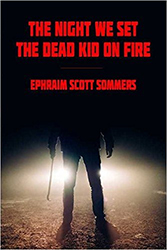My friend the Poet: The Night We Set the Dead Kid on Fire
By: Dustin Hyman
Do you ever wonder what happened to that religious kid from Junior High School? In the case of my best friend, the kid grows up and writes poems about sin. The Night We Set the Dead Kid on Fire was published in February of 2017 by Tebot Bach Press. This collection of poems is about small towns and poor people, a book where the unwanted gather to fuck, fight and do drugs. Taboo sex, unredeemable acts of violence and illicit drug use unfold like a dark carnival, taking readers from California to Florida, with stops in Kalamazoo, Tuscaloosa, and “White City, Mississippi.”
In 1994 Ephraim Scott Sommers was passionate about Christian youth group and he refused to cuss. It took my crew eight years to break him: “Poker Nights” aged us at an accelerated rate. Does knowing the author make me less qualified to review his book? Maybe. But keep in mind, we’ve been exchanging creative work for over a decade. Pleasantries were done away with years ago. His criticism is bitter, and I enjoy making him suffer.
On the phone I complain about poetry, lamenting archaic styles and coded language. Like me, Sommers enjoys poetry that entertains, and his work makes a conscious effort to avoid being esoteric or academic. He uses poetry to tell stories, and he’s one of a hundred bad guys wrapped in verse, ready to assault you:
we have arrived at the moment our sides have been chosen,and for your sympathy, you’re going to be some kid
going down in A-Town, in the night, in the human ring,
and I’m going to be one of ten locals kicking you (9).
Sommers provides a dramatic form of confessional poetry, enlarging themes of depression and suicide to include drug use and violence. I don’t think my friend would like the term ‘confessional’ applied to his work, and I take comfort in that. More often than not, these confessions are communal. Each town in this country has drug abuse and alcohol abuse and people abuse—these poems are a reminder of that:
And you can’t drink your way out, but you will trya fifth of Jim Beam, two Percocet, and rough sex
with a pink bandanna
for a blindfold, your first finger in the ass (9).
Don’t worry—these sex-craved self-medicators with violent tendencies aren’t without humanity. Among the gutter punks and brawlers emerges the working class in all its glory. These blue collar heroes are friends:
my hungover friends fastening tool belts and waltzing onto job sites (49).These blue collar heroes are fathers:
If you’re from a small town, then you know about the soundof work boots, and coffee pots, and the diesel engine
warming up outside your bedroom window (29).
These blue collar heroes are mothers:
. . . The eighteen-wheeler queen,she’s the hot hand in meatloaf. Your mother
would drag a boxed-up house on a flatbed trailer
to Baton Rouge tonight if you asked her (23).
These blue collar heroes are siblings:
. . . sister of the school expulsion, of the return home to work with a jugof tomato juice and her uncle’s lumber yard to pay back
her mother for lawyer’s fees, to marry a man with one beard
one horse trailer, and two DUI’s… (29).
These blue collar heroes are small towns:
You have not hunched at the sink and spongedfor a ten-hour shift. This hymn is not for you
or how much you don’t notice. This is for the phantom
refiller of soap dispensers, the secret detailer
of overlooked linoleum! (30).
Somehow these poems about sin culminate to proselytize working class grit—the characters each town has but fails to celebrate (aside from police reports and government statistics). These people are interesting and their stories need telling. Reading this collection is like buckling into a Narcotics Anonymous meeting told in stanzas, and each speaker brings their best shit:
for we must also learn to praise what may end up ugly in us (60).
A singer-songwriter and poet from Atascadero, California, Ephraim Scott Sommers is the author of The Night We Set the Dead Kid on Fire which won the 2016 Patricia Bibby First Book Award and was published in February of 2017 by Tebot Bach Press. Recent essays and poems have appeared or are forthcoming in Beloit Poetry Journal, Cream City Review, Prairie Schooner, TriQuarterly, Verse Daily, and elsewhere. Having received his PhD from Western Michigan University, Ephraim currently teaches creative writing on the graduate faculty at the University of Central Florida and lives with his fiancé in Orlando. For music and poems and to purchase the book, please visit his website here.
.jpg)